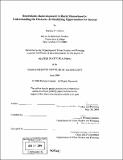Brownfields redevelopment in rural Massachusetts : understanding the obstacles & identifying opportunities for success
Author(s)
Gallant, Darlene E. (Darlene Elizabeth), 1978-
DownloadFull printable version (8.852Mb)
Other Contributors
Massachusetts Institute of Technology. Dept. of Urban Studies and Planning.
Advisor
William Shutkin.
Terms of use
Metadata
Show full item recordAbstract
Remediating and redeveloping contaminated properties represents a mounting national concern. Commonly referred to as brownfields, these contaminated and often vacant or underused, properties present significant environmental and public health risks. Once cleaned, these properties create jobs, stimulate the tax base, preserve open space and sensitive natural resources, and protect public health. As the nation's population grows, we consume more acres per capita than ever before; as a result, the amount of unspoiled land available for development decreases. However, in rural areas the abundance of untouched land provides no incentive to redevelop brownfields. Private developers and public agencies use brownfields redevelopment as a tool for managing urban growth. In contrast, rural brownfields sites lay abandoned while valuable open space is consumed by new development. Understanding why rural brownfields are not developed more frequently is the purpose of this thesis. What are the barriers encountered by rural Massachusetts communities when cleaning or redeveloping contaminated property? Furthermore, what are the elements that have allowed some rural communities to see success in cleanup or redevelopment? The Commonwealth of Massachusetts acts as the microcosm from which the proposed study will examine the ability of rural communities to inventory, assess, remediate, and reuse contaminated property. A case study approach was chosen to provide a means of comparing three distinct communities and their experiences. (cont.) A close investigation of these three communities and the brownfields projects within them identifies the existence of brownfields in rural areas, captures the unique obstacles faced by a range of rural community types, and provides insight into how some communities overcame obstacles in the cleanup and redevelopment of rural brownfields. I argue that as a result of inherent rural characteristics, a distinct urban advantage over rural communities exists in the administration of the Massachusetts Brownfields Program. This advantage results primarily from a strained economy, limited municipal capacity, and sparse brownfields experience in rural communities. In conclusion, the thesis provides capacity-building recommendations for rural communities to encourage participation in brownfields programs.
Description
Thesis (M.C.P.)--Massachusetts Institute of Technology, Dept. of Urban Studies and Planning, 2004. Includes bibliographical references (p. 107-111).
Date issued
2004Department
Massachusetts Institute of Technology. Department of Urban Studies and PlanningPublisher
Massachusetts Institute of Technology
Keywords
Urban Studies and Planning.